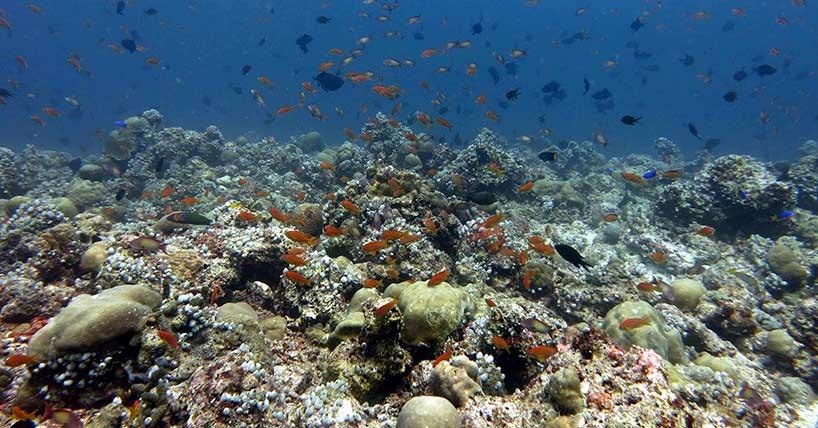Feb 22 2021
A Newcastle University-led study has demonstrated that predatory reef fish at the top of the food chain depend on resources from the open ocean rather than from the reef itself.
 Plankton-feeding fishes often dominate the fish assemblage on oceanic coral reefs. Image Credit: Newcastle University.
Plankton-feeding fishes often dominate the fish assemblage on oceanic coral reefs. Image Credit: Newcastle University.
From Charles Darwin’s era, the abundance of life on coral reefs has remained mysterious, since the majority of the oceanic surface waters in the tropics appear low in nutrients and unproductive.
However, a new study under the guidance of Newcastle University, published in the Science Advances journal, has found that the food web of a coral reef in the Maldives depends more and more on what enters from the open ocean.
The researchers have discovered that such offshore resources contribute to over 70% of reef predator diets and the remaining is obtained from sources that are linked with reefs.
Headed by Dr. Christina Skinner, presently based at the Hong Kong University of Science and Technology, the team included collaborators from Woods Hole Oceanographic Institution (United States), Banyan Tree Marine Lab (Maldives) and the University of Bristol (United Kingdom).
The researchers employed sophisticated stable isotope methods to demonstrate that four species of grouper close to the top of the food web all depend on offshore resources.
This did not vary between species and was the same on the outer part of an atoll and even within the lagoon, indicating that the oceanic subsidy is system-wide.
The researchers consider that this offshore energy might be making its way into the food web via lower-level plankton feeding fish that the groupers are further feeding on. This is probably assisted by inputs of nutrient-rich deep water, which are not well understood.
The study results help describe how coral reefs retain high productivity in seemingly nutrient-poor tropical settings, but also reiterate their vulnerability to future fluctuations of ocean productivity, which have been anticipated in several climate-change models.
Understanding the Impacts of Anthropogenic and Climate-Induced Change in Marine Ecosystems
Tropical waters are considered to be poor in nutrients and so coral reefs are oases of life in an oceanic desert.
The study provides key insights into the nutrition of coral reef ecosystems, especially their dependence on offshore production. Detailed knowledge of food web dynamics is crucial to understand the impacts of anthropogenic and climate-induced change in marine ecosystems.
Dr Christina Skinner, Hong Kong University of Science and Technology
“The results force us to reconsider how we view coral reefs, and they highlight the extent of the connectivity with the surrounding ocean. If these groupers are mostly reliant on offshore energy to support their feeding, then maybe they won’t be so impacted by the loss of live coral, as many fishery studies have predicted; they may be more resilient,” she added
Dr Skinner further noted, “On the other hand though, some studies have predicted that ocean production will decline in the future from climate change. If that is the case, and these groupers are reliant on that open ocean energy, they will be impacted by those changes.”
Coral reefs are really suffering across the tropics from climate-related disturbances, particularly oceanic warming. In spite of its tiny area, this ecosystem is a massive contributor to marine biodiversity and this study highlights how little we know about the food web sources sustaining that exceptional wealth of species it sustains.
Nick Polunin, Study Co-Author and Professor, School of Natural and Environmental Sciences, Newcastle University
Journal Reference:
Skinner, C., et al. (2021) Offshore pelagic subsidies dominate carbon inputs to coral reef predators. Science Advances. doi.org/10.1126/sciadv.abf3792.